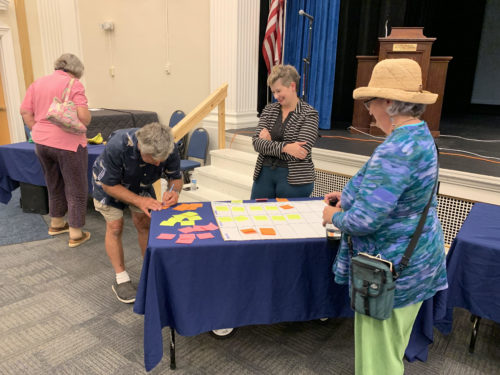Cooperative Housing Initiative
The shortage of affordable housing has reached crisis levels for many North Country communities, deeply impacting the people and businesses who are so essential for sustaining a vibrant regional economy. ANCA is among a number of local and regional organizations who are working on solutions.
In 2022, catalyzed by an unprecedented opportunity to envision and develop a cooperative housing project on a gifted property in Lake Placid, ANCA tapped into our strong networks and our experience with worker-owned businesses to bring an affordable housing alternative to the community. We partnered with the Cooperative Development Institute (CDI) to provide residents and employers with information and support for creating a housing cooperative.
In the following months, ANCA and CDI worked closely with the steering committee members who are guiding the development of the cooperative housing project. The group has developed a mission, vision and bylaws that they are using to govern key decisions to move their project forward. The committee has since transitioned to a board whose members are gaining critical skills in group decision making, facilitation and governance that will contribute to the long-term success of the project.
When complete, the housing development will consist of several residences of various configurations with the goal of affordability for hospitality workers, teachers, healthcare workers, guides, construction workers, retirees and others who want to live in Lake Placid permanently but are challenged by the lack of long-term rentals or affordable homes on the market. The board is working with a local architect, a town official and a college professor to create a design concept that will help them secure financing for a final design and related infrastructure.
Set on 100 acres in Lake Placid, where developable land is scarce, the project will help address the immediate and long-term housing needs of community members and serve as an example for others interested in exploring cooperative housing solutions for their communities.
The group is currently seeking prospective member-owners to join the board and help with the visioning and implementation of this project. Individuals interested in learning more about the initiative or joining the board may contact Board Vice President Martha Pritchard Spear at [email protected].
——
Banner photo: In April 2023, co-op housing steering committee members and other area residents joined ANCA and Homestead Development Corp. for a tour that explored how modular construction in Lake Placid could provide affordable housing solutions.
Lower photo: ANCA’s Dani Delaini, center, and community members at a “Co-op 101” Learning Session in August 2022.
Seven Cooperative Principles
1. Open and Voluntary Membership
Membership in a cooperative is open to all people who can reasonably use its services and stand willing to accept the responsibilities of membership, regardless of race, religion, gender, or economic circumstances.
2. Democratic Member Control
Cooperatives are democratic organizations controlled by their members, who actively participate in setting policies and making decisions. Representatives (directors/trustees) are elected among the membership and are accountable to them. In primary cooperatives, members have equal voting rights (one member, one vote); cooperatives at other levels are organized in a democratic manner.
3. Members’ Economic Participation
Members contribute equitably to, and democratically control, the capital of their cooperative. At least part of that capital remains the common property of the cooperative. Members allocate surpluses for any or all of the following purposes: developing the cooperative; setting up reserves; benefiting members in proportion to their transactions with the cooperative; and supporting other activities approved by the membership.
4. Autonomy and Independence
Cooperatives are autonomous, self-help organizations controlled by their members. If they enter into agreements with other organizations, including governments, or raise capital from external sources, they do so on terms that ensure democratic control as well as their unique identity.
5. Education, Training, and Information
Education and training for members, elected representatives (directors/trustees), CEOs, and employees help them effectively contribute to the development of their cooperatives. Communications about the nature and benefits of cooperatives, particularly with the general public and opinion leaders, help boost cooperative understanding.
6. Cooperation Among Cooperatives
By working together through local, national, regional and international structures, cooperatives improve services, bolster local economies, and deal more effectively with social and community needs.
7. Concern for Community
Cooperatives work for the sustainable development of their communities through policies supported by the membership.
